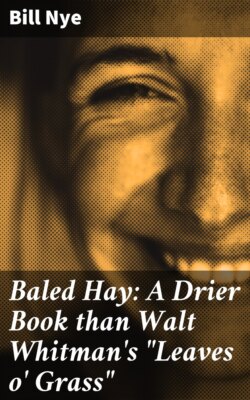Читать книгу Baled Hay: A Drier Book than Walt Whitman's "Leaves o' Grass" - Nye Bill - Страница 19
На сайте Литреса книга снята с продажи.
ONE KIND OF A BOY.
ОглавлениеTable of Contents
I AM always sorry to see a youth get irritated and pack up his clothes, in the heat of debate, and leave the home nest. His future is a little doubtful, and it is hard to prognosticate whether he will fracture limestone for the streets of a great city, or become President of the United States; but there is a beautiful and luminous life ahead of him in comparison with that of the boy who obstinately refuses to leave the home nest.
The boy who cannot summon the moral courage some day to uncoil the tendrils of his heart from the clustering idols of the household, to grapple with outrageous fortune, ought to be taken by the ear and led away out into the great untried realm of space.
While the great world throbs on, he sighs and refuses to throb. While other young men put on their seal-brown overalls and wrench the laurel wreath and other vegetables from cruel fate, the youth who dangles near the old nest, and eats the hard-earned groceries of his father, shivers on the brink of life's great current and sheds the scalding tear.
He is the young-man-afraid-of-the-sawbuck, the human being with the unlaundried spinal column. The only vital question that may be said to agitate his pseudo brain is, whether he shall marry and bring his wife to the home nest, or marry and tear loose from his parents to live with his father-in-law. Finally he settles it and compromises by living alternately with each.
How the old folks yearn to see him. How their aged eyes light up when he comes with his growing family to devour everything in sight and yawn through the space between meals. This is the heyday of his life; the high noon of the boy who never ventured to ride the yearling colt, or to be yanked through the shimmering sunlight at the tail of a two-year-old. He never dared to have any fun because he might bump his nose and make it bleed on his clean clothes. He never surreptitiously cut the copper wire off the lightning rod to snare suckers with, and he never went in swimming because the great, rude boys might duck him or paint him with mud. He shunned the green apple of boyhood, and did not slide down hill because he would have to pull his sled back to the top again.
Now, he borrows other people's newspapers, eats the provisions of others, and sits on the counter of the grocery till the proprietor calls him a counter irritant.
There can be nothing more un-American than this flabby polyp, this one-horse tadpole that never becomes a frog. The average American would rather burst up in business six times in four years, and settle for nine cents on the dollar, than to lead such a life. He would rather be an active bankrupt than a weak and bilious barnacle on the clam-shell of home.
The true American would rather work himself into luxury or the lunatic asylum than to hang like a great wart upon the face of nature. This young man is not in accordance with the Yankee schedule, and yet I do not want to say that he belongs to any other nation. Foreign powers may have been wrong; trans-Atlantic nations may have erred, and the system of European government may have been erroneous, but I would not come out and charge them with this horrible responsibility. They never harmed me, and I will not tarnish their fair fame with this grave indictment.
He will breathe a certain amount of atmosphere, and absorb a given amount of feed for a few years, and then the full-grown biped will leave the home nest at last. The undertaker will come and get him and take what there is left of him out to the cemetery. That will be all. There can be no deep abiding sorrow for him here; public buildings will not be draped in mourning, and you can get your mail at the usual hour when he dies. The band will not play a sadder strain because the fag-end of a human failure has tapered down to death, and the soft and shapeless features are still. You will have no trouble getting a draft cashed on that day, and the giddy throng will join the picnic as they had made arrangements to do.
